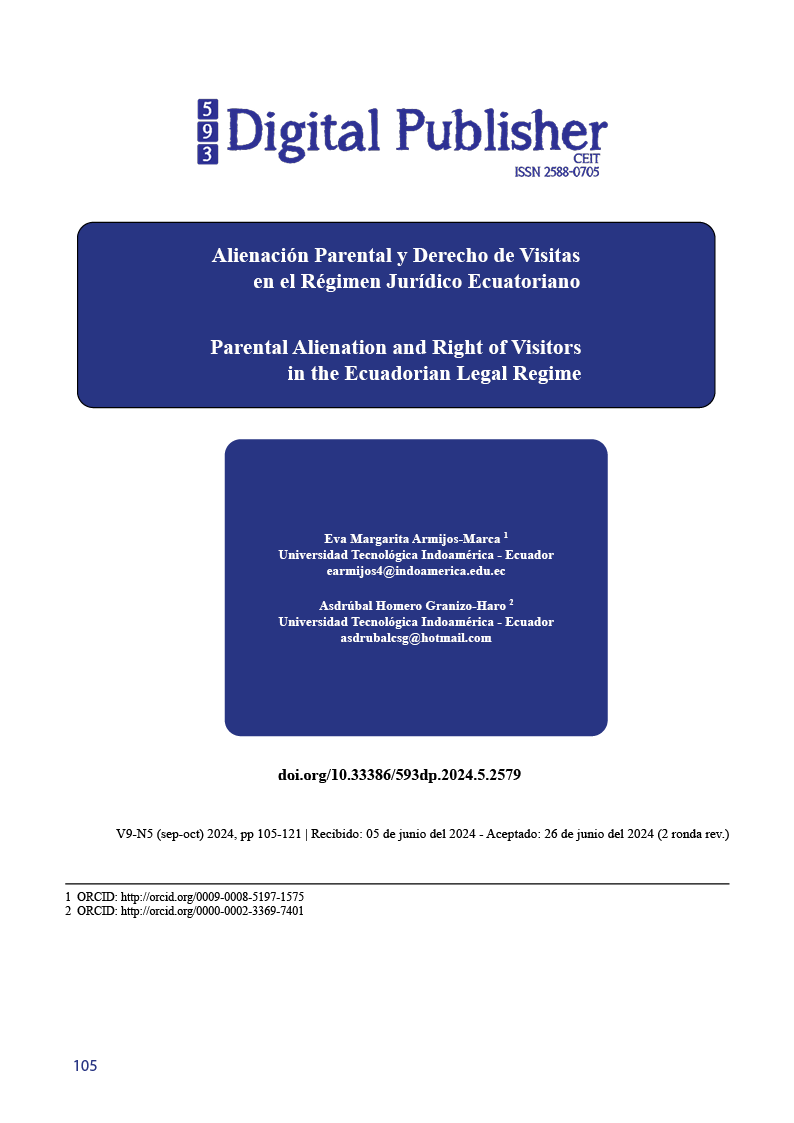Parental Alienation and Right of Visitors in the Ecuadorian Legal Regime
Main Article Content
Abstract
After a separation or divorce process, children are forced to live with one of their parents, it is at that moment, when the parent who oversees custody, exercises act of parental alienation against the absent parent. The alienating parent consciously or unconsciously uses acts that lead to brainwashing the child or adolescent, so that he or she rejects any type of bond with the absent parent, secondarily causing an impact on the right of visitation. This research aims to identify the main behaviors of the alienating parent, the consequences-sequelae that are caused to the alienated and the importance of regulating this phenomenon in our legislation. It is essential to state that the phenomenon of Parental Alienation is not regulated in our legislation, which facilitates the obstruction of visitation rights. The methodology that will be applied in this study is hermeneutics, comparative and exegetical law, with a qualitative approach.
Downloads
Article Details

This work is licensed under a Creative Commons Attribution-NonCommercial-ShareAlike 4.0 International License.
1. Derechos de autor
Las obras que se publican en 593 Digital Publisher CEIT están sujetas a los siguientes términos:
1.1. 593 Digital Publisher CEIT, conserva los derechos patrimoniales (copyright) de las obras publicadas, favorece y permite la reutilización de las mismas bajo la licencia Licencia Creative Commons 4.0 de Reconocimiento-NoComercial-CompartirIgual 4.0, por lo cual se pueden copiar, usar, difundir, transmitir y exponer públicamente, siempre que:
1.1.a. Se cite la autoría y fuente original de su publicación (revista, editorial, URL).
1.1.b. No se usen para fines comerciales u onerosos.
1.1.c. Se mencione la existencia y especificaciones de esta licencia de uso.
References
Asociación Americana de Psiquiatría. (2014). Guía de consulta de los Criterios Diagnósticos del DSM-5TM. https://www.eafit.edu.co/ninos/reddelaspreguntas/Documents/dsm-v-guia-consulta-manual-diagnostico-estadistico-trastornos-mentales.pdf
Baker, A. (2007). Adult Children of Parental Alienation Syndrome Breaking the Ties that Bind.
Bernet, W., & Baker, A. (2013). Parental alienation, DSM-5, and ICD-11: Response to critics. The journal of the American Academy of Psychiatry and the Law. https://jaapl.org/content/jaapl/41/1/98.full.pdf
Buenaño, J. E. J., & Naranjo, N. E. M. (2018). El Régimen de Visitas tras la Separación de los Padres. Casos Ambato. (Ecuador). Verba luris, 40, Article 40. https://doi.org/10.18041/0121-3474/verbaiuris.40.1557
Cabrera, S. V. C., Ortega, F. J. C., Leiva, W. J. V., Manzanillas, P. L. M., Donoso, S. A. M., Hoyos, G. X. P., & Ruiz, N. C. F. (2023). La regulación de la alienación parental en la legislación de Ecuador como prevención de la obstrucción del régimen de visitas: The regulation of Parental Alienation in the legislation of Ecuador as a prevention of obstruction of the visitation regime. LATAM Revista Latinoamericana de Ciencias Sociales y Humanidades, 4(5), Article 5. https://doi.org/10.56712/latam.v4i5.1367
Cerpa Vargas, K. J., & Valdivia Ramirez, M. T. (2021). La alineación parental ejercida sobre los menores y la suspensión de la patria potestad. Repositorio Institucional - UCV. https://repositorio.ucv.edu.pe/handle/20.500.12692/71035
Código Civil del Estado de Querétaro (2009). https://site.legislaturaqueretaro.gob.mx/CloudPLQ/InvEst/Codigos/COD001_60.pdf
Código Civil para el Estado de Baja California (2022). https://www.congresobc.gob.mx/Documentos/ProcesoParlamentario/Leyes/TOMO_III/20220211_CODCIVIL.PDF
Código de la Niñez y Adolescencia- CNA, Pub. L. No. Registro Oficial 737 (2003). https://www.fielweb.com/Index.aspx?21&nid=33#norma/33
Constitución de la República del Ecuador, Pub. L. No. Registro Oficial 449 (2008). https://www.fielweb.com/Index.aspx?54&nid=1#norma/1
Convención sobre los Derechos del Niño. (2013). Observación general No 14 (2013) sobre el derecho del niño a que su interés superior sea una consideración primordial (artículo 3, párrafo 1). Refworld. https://www.refworld.org/es/ref/polilegal/crc/2013/es/95780
Darnall, D. (1998). Divorce Casualties: Protecting Your Children from Parental Alienation. Rowman & Littlefield.
De la Rosa Neira, A. M., & Ortiz Vera, S. V. (2022). Experiencias y estrategias de afrontamiento frente a la alienación parental en una muestra de progenitores padres. [Bachelor thesis, Universidad Santo Tomás]. https://repository.usta.edu.co/handle/11634/48073
Flores Preciado, E. (2021). La alienación parental y su repercusión en algunos derechos humanos de niñas, niños y adolescentes en México. Universidad Autónoma de Baja California. Facultad de Derecho.
Gardner. (2002). Denial of the Parental Alienation Syndrome Also Harms Women. https://doi.org/10.1080/019261802753577520
Gardner, R. (1985). Recent Trends in Divorce and Custody Litigation by Richard A. Gardner. https://www.fact.on.ca/Info/pas/gardnr85.htm
González. (2016). Las Interferencias Parentales y la Alienación Parental en el contexto jurídico español: Revisión de sentencias judiciales en materia de guarda y custodia. https://core.ac.uk/download/pdf/84748144.pdf
INEC. (2023). Registro Estadístico de Matrimonios y Divorcios. https://www.ecuadorencifras.gob.ec/documentos/web-inec/Poblacion_y_Demografia/Matrimonios_Divorcios/2022/Principales_resultados_MYD_2022.pdf
Ley 24.270 (1993). https://www.argentina.gob.ar/normativa/nacional/ley-24270-668/texto
Ley N° 12.318/10 (2010). https://www.afamse.org.ar/files/Brasil-LEY-alienacion-parental.pdf
Mojica Acero, L. J. (2014). Protección de niños, niñas y adolescentes en caso de alienación parental y debilitamiento de las relaciones parento filiales. https://repositorio.unal.edu.co/handle/unal/47646
Mroczkowski, M. M., & Billick, S. B. (2015). Review of “Parental Alienation: The Handbook for Mental Health and Legal Professionals,” edited by Demosthenes Lorandos, William Bernet, and S. Richard Sauber. The American Journal of Family Therapy, 43(1), 99–101. https://doi.org/10.1080/01926187.2014.988592
Pineda, J. A. (2018). EL SÍNDROME DE ALIENACIÓN PARENTAL EN LA LEGISLACIÓN Y JURISPRUDENCIA NACIONAL. file:///C:/Users/Jur%C3%ADdico/Downloads/Dialnet-ElSindromeDeAlienacionParentalEnLaLegislacionYJuri-6523165%20(2).pdf
Portilla-Saavedra, D., Moya-Vergara, R., Pinto-Cortez, C., Portilla-Saavedra, D., Moya-Vergara, R., & Pinto-Cortez, C. (2021). Perspectivas y tendencias actuales del concepto de alienación parental: Una revisión sistemática de la literatura. Terapia psicológica, 39(2), 237-255. https://doi.org/10.4067/s0718-48082021000200237
Resolución 194 (2023). https://www.funcionjudicial.gob.ec/resources/pdf/resoluciones/2023/194-2023.pdf
Resolución 18202-2014-1931 (2014). https://procesosjudiciales.funcionjudicial.gob.ec/actuaciones
Reyes, H. A. V., & Campas, M. A. S. (2022). Avances de la Alienación Parental y su regulación en el Estado Mexicano. Saber, Ciencia y Libertad, 17(1), Article 1. https://doi.org/10.18041/2382-3240/saber.2022v17n1.8469
Sentencia 18334-2010-0896V (2020). http://esacc.corteconstitucional.gob.ec/storage/api/v1/10_DWL_FL/e2NhcnBldGE6J3NvcnRlbycsIHV1aWQ6JzlkMTU2ZWY2LTMxOWEtNGQ1Zi05NzQ3LTE2YTA4M2QwZWJkNy5wZGYnfQ==
Sentencia No. 28-15-IN (2021). https://www.corteconstitucional.gob.ec/sentencia-28-15-in-21/
Urgilés, S. J. O., & Cabrera, E. E. P. (2023). La tenencia compartida en el Ecuador. Polo del Conocimiento, 8(2), Article 2. https://doi.org/10.23857/pc.v8i2.5274
Vilalta, R., & Winberg, N. (2017). Sobre el mito del Síndrome de Alienación Parental (SAP) y el DSM-5. Papeles del Psicólogo - Psychologist Papers, 37(1). https://doi.org/10.23923/pap.psicol2017.2843
Viteri, M. (2022). “LA GARANTÍA DEL PRINCIPIO DE PROTECCIÓN INTEGRAL Y EL INTERÉS SUPERIOR DEL NIÑO FRENTE A LA ALIENACIÓN PARENTAL EN EL DIVORCIO O SEPARACIÓN DE HECHO EN EL ECUADOR” [Universidad del Azuay]. http://dspace.uazuay.edu.ec/handle/datos/11658
Zicavo Martínez, N., Rey Clericus, R., & Ponce, L. (2021). Escala ZICAP II: Evaluación de alienación parental en niños de 9 a 15 años de padres separados en Chile. Ciencias Psicológicas. https://doi.org/10.22235/cp.v15i1.2159



